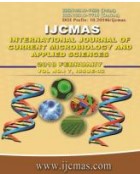


 National Academy of Agricultural Sciences (NAAS)
National Academy of Agricultural Sciences (NAAS)

|
PRINT ISSN : 2319-7692
Online ISSN : 2319-7706 Issues : 12 per year Publisher : Excellent Publishers Email : editorijcmas@gmail.com / submit@ijcmas.com Editor-in-chief: Dr.M.Prakash Index Copernicus ICV 2018: 95.39 NAAS RATING 2020: 5.38 |
The ability to produce crops throughout the entire year is of great interest for mango production under sub-tropical and semi-arid conditions. The biennial bearing is very serious problem in north, east and central Indian commercial cultivars, while most of the south Indian varieties bear regularly. Therefore, application of cultar is most widely studied in view of its high potential for controlling plant growth and development of fruit crops in general and mango production in particular. It is applied either in the soil or as foliar spray in the September-November. The persistence of cultar in orchard soil for a long time and its half-life varies with soil type and climatic conditions, which may severely affect the development of subsequent crops and moved rapidly between the shoot tips and basal nodes both in the acropetal and basipetal directions and persisted for several months. It inhibits gibberellin biosynthesis at kaurene stage and has proved to be reduction of vegetative growth, promising for flower initiation in shoot bud, giving early and profuse flowering, increases fruit yield and improving quality regularly in alternate bearing cultivars. The main aim of this review is to focus upon contemporary information about cultar in mango production.
 |
 |
 |
 |
 |